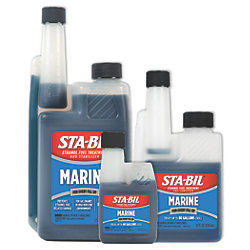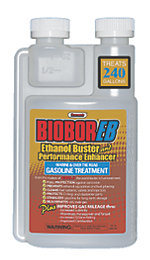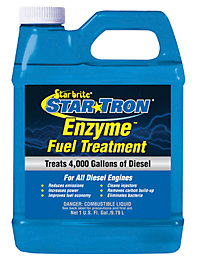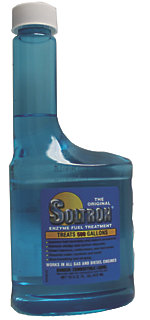Marine Fuel Additives
 As a boat owner getting ready to winterize their boat, you may be wondering about fuel additives and how they might benefit your engine. In this Navigator we will take a look at what fuel additives do and why you should be adding them to your gasoline and/or diesel fuel tanks with every fill up. But before we begin, it's important to understand the potential problems related to gasoline and diesel fuel – especially when it sits for extended periods.
As a boat owner getting ready to winterize their boat, you may be wondering about fuel additives and how they might benefit your engine. In this Navigator we will take a look at what fuel additives do and why you should be adding them to your gasoline and/or diesel fuel tanks with every fill up. But before we begin, it's important to understand the potential problems related to gasoline and diesel fuel – especially when it sits for extended periods.
Understanding Fuel Issues
Gasoline – Most of the gasoline sold in the U.S. now contains up to 10% ethanol, which was added because it helps fuel burn cleaner and it boosts the octane level – which helps reduce knocking in higher compression engines like 4-strokes. Unfortunately, since ethanol is an alcohol, it can attract moisture from the air and absorb water – which in a marine environment, can be a big problem.

Diesel – around a decade ago the EPA called for the reduction of sulfur content in diesel fuel. This modified diesel (referred to as Ultra-Low Sulfur Diesel or ULSD), while better for the environment, is more susceptible to algae and bacterial growth when stored over long periods. This can then lead to a disgusting gooey mess in your tank that will clog your fuel system and cause major problems with your engine. Since microbial growth is one of the most common reasons for fuel-related engine failure – prevention is extremely important. In addition, the requirement for lower sulfur content also means reduced lubrication – which is necessary to protect your injectors and fuel pumps. Modern fuel additives work to combat both of these issues (among others) so that you can leave your fuel sitting for months without fearing the worst.
 What Fuel Additives Do
What Fuel Additives Do
Now that you know some of the issues you're up against – here are some of the things fuel additives do to protect your fuel systems. Since there are differences between brands, it's important to read the label to make sure the fuel additive you choose covers the things you are concerned about.
Oxidation Reduction – when oxygen reaches gasoline it begins breaking the fuel down into gums and varnish that can damage the inside of your engine, made worse by the alcohol in ethanol-blended fuel. Fuel additives reduce oxidation, and prevent the formation of gums, varnish and other solids - making the fuel more stable over extended periods and preventing solids that clog carburetors and fuel injectors.
Phase Separation – as we discussed above, this can happen in gasoline when the water content exceeds 4 tbsp. per gallon – making your fuel completely unusable. Fuel additives cure this in one of two ways: by disbursing water in smaller micro particles or by using demulsifiers that force minute water droplets out of suspension to be more effectively removed through filtration.
Clean and Protect – by incorporating detergents and deposit modifiers, fuel additives not only remove deposits made as a byproduct of the combustion process, but they also help prevent future buildup – resulting in more uniform combustion, increased fuel efficiency, and better reliability/overall performance.

Microbial Growth – by removing water and adding biocides, fuel additives kill microbial growth and take away the environment in which bacteria, fungi and algae growth flourish in – eliminating the sludge that can clog your fuel system.
Cetane Improvement – for diesel fuel, cetane measures the time between the fuel injection and ignition and provides the combustion characteristics of the fuel. Some fuel additives raise the cetane level, which results in more efficient combustion, quicker starting, and reduced warm-up periods, engine noise and white smoke.
Lubrication – due to reduced sulfur levels in diesel fuel, the natural lubrication properties have been greatly diminished – causing damage to injectors and fuel pumps. Fuel additives add agents to lubricate critical fuel system components, protecting the fuel system from premature wear.
Improved Fuel Economy – fuel additives remove carbon build-up and clean the entire fuel delivery system while also modifying how fuel burns, resulting in more uniform combustion, increased fuel efficiency and reduced emissions.
 How to Use Fuel Additives
How to Use Fuel Additives
Now that you understand the benefits, incorporating fuel additives into your fuel system maintenance couldn't be simpler. All you have to do is add the product of your choice to your fuel and let it go to work. Each manufacturer has a recommended dosage amount – so make sure to follow it carefully. We highly recommend you make it a habit to include a good additive every time you refuel so that you never forget. If you are interested in buying a fuel additive – Fisheries Supply stocks all of the most popular brands – including Biobor, Sta-Bil, Stanadyne and Star-Tron just to name a few.
We hope this Navigator has helped you understand the importance of using fuel additives to protect your fuel systems and engine performance – but if you have any additional questions, please don't hesitate to contact our product experts at
(800) 426-6930.